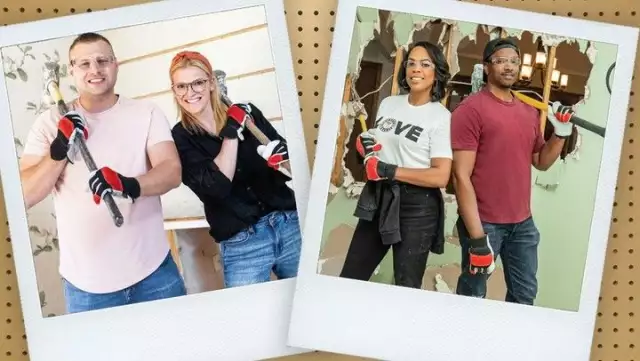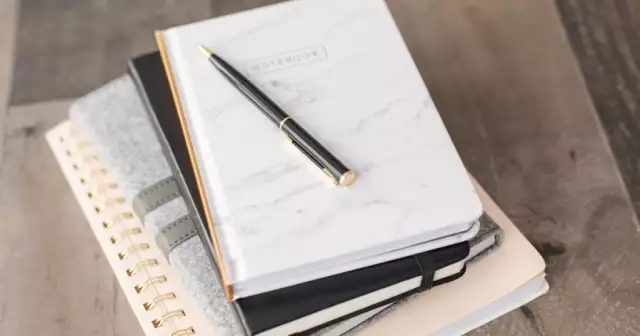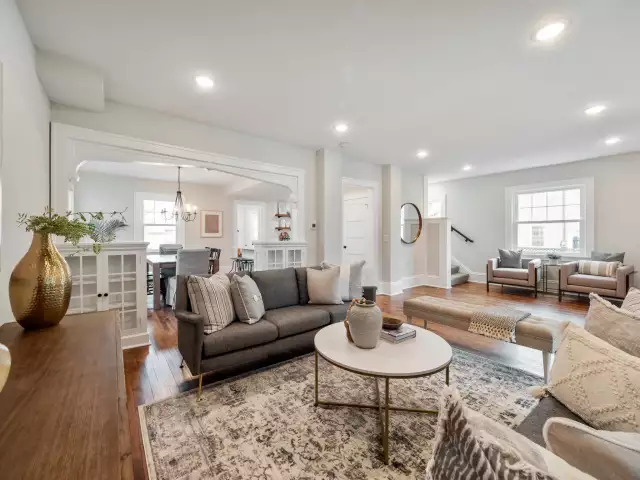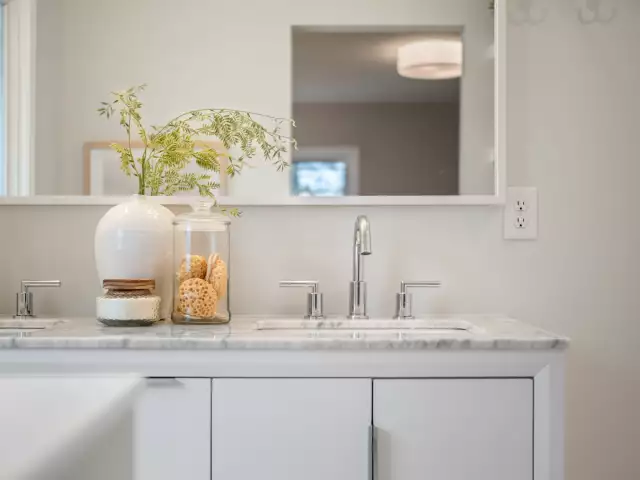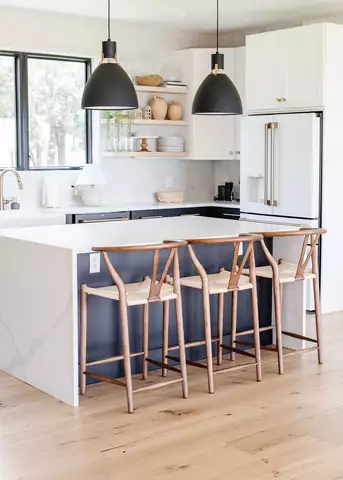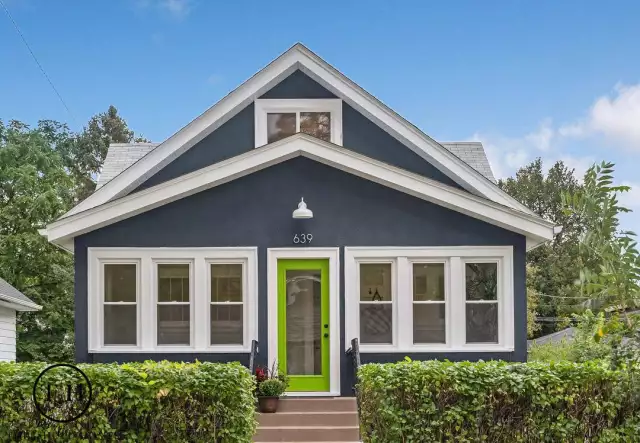Exclusive: The Stars of HGTV’s ‘Flip to a Million’ Reveal How To Flip a House for a Thousand Bucks
Exclusive: The Stars of HGTV’s ‘Flip to a Million’ Reveal How To Flip a House for a Thousand Bucks
Think you need oodles of cash and the skills of a contractor to flip a house? New HGTV show “Flip to a Million” argues that all you really need is $1,000—along with a whole lotta heart and hard work.
Premiering in August, the show follows two flipping duos who got their start under modest circumstances: EJ and Jason Williams from Chicago and Dani and Jon Wrobel from Long Island. Soon enough, their efforts rewarded them with million-dollar sales. Now, they’ve both moved to the booming market of Dallas to see if they can take their flipping businesses to the next level.
Eager to learn how they got into flipping and turned out so successful, we talked with these two teams to hear their best secrets for how to get started, what makes a good flip, and more you’ll be surprised to know.
What are the first steps for flipping a home?
Jason Williams: You really need to study the market. Be aware of what home values are. Try your best to get a home for a great deal so you can make some money on the back end. Build your team; that’s having a great [real estate agent] to help you and having great contractors because they are really key to having a successful project.
Jon Wrobel: Start off low, don’t get discouraged by smaller margins, and you just have to build on top of that. We didn’t start off at a million-dollar house. We started off at a house for $135,000.
Is $1,000 really enough money to embark on your first flip?
Dani Wrobel: It was for us. Only a couple of hundred dollars to put toward marketing, put in a lot of sweat equity, a lot of footwork going to houses, knocking on doors; just really doing anything you can that’s for free and investing the money that you have wisely to get going.
EJ Williams: A traditional flip, the typical way that it’s done is you’ll get a construction loan, which will help you with the purchase and give you the money that you need for the renovation. Typically it’s more than $1,000. We also highly recommend you have an emergency fund because something is going to come up outside the scope of work you’ve asked your lender to give you.
Do you have to be handy?
Jon: It’s a misconception that you have to be Mr. Handy to be into house flipping. It’s a plus.
EJ: Maybe a talent or an eye for design because that’s such a big part of it. The other part is educating yourself on real estate and the process of construction. You don’t have to already be a master; over time you’ll get better, but you need to have someone on your team that has those attributes.
What makes a good flip?
Dani: You want to invest in the area. Good schools, restaurants, close to highways.
Jon: You have to find things in a market that translates to prosperity and growth: main streets, universities and colleges, arts and music venues, restaurants, stores.
And a house that can encompass everything increases the value of a flip because it broadens your population of buyers. For example, one of the houses we did had a garage in the back, which had a side entrance where it could be used for an office or another apartment, and the main space was great for a family. That was a great flip because of all the different potential it could be used for.
Jason: It’s all about the numbers. Definitely paying attention to what the home values are in that area and making sure you can keep your renovation cost at what you estimated.
What financing avenues should new house flippers explore for capital?
Jason: Think about using a partner. Then you can pool your money to get a deal done and not [feel] like you’re in the project all alone.
Jon: Wholesaling. You’re finding a great investment and then you’re passing along the rights to buy that house to another investor. You never own the house. You’re getting a finder’s fee for finding another investor a property. We did an interest-only loan, also known as a bridge loan or a rehab loan, and it utilizes private financing. They give you a large amount of capital to buy the house; however, you’re only paying interest.
What sinks a project?
Dani: Getting caught up in the design. You have to have it appealing to your buyers, but you can’t do things that are [too] trendy or that narrow the market of who wants to buy the house.
Jon: When you overvalue your property. You want to get a house sold quick. You don’t want to sit there and pay interest-only mortgage payments. You don’t want to pay taxes.
EJ: One of the biggest things we tell people is to hire slow and fire fast when it comes to contractors. Hire slow because you really need to vet them. This is not a phone call conversation. This is not them texting you pictures of their projects because they could very well not be their projects. If you find the contractor not showing up, giving you excuses constantly, don’t listen to that for weeks. Cut your losses and move on.
Dallas is such a hot house-flipping market. Where else is there potential?
EJ: You definitely want to go where it’s thriving. I can see Nashville, somewhere in the Carolinas, Atlanta, Florida. I think those would be welcome markets for this.
How much money should house flippers aim to make on each project?
Jon: Your target return on investment is around 35%. That doesn’t happen always. If you see a deal and can get it done quick, even if you can make 15% on it, it may be worth it.
Jason: Especially for beginners, you want enough room where you can clear $50,000 at the end.
What’s your best advice for new investors in today’s housing market?
Jason: Real estate will always be the right path toward creating generational wealth. And I think during these times where people see interest rates going up, it’s still a great time to buy. You just have to have the right strategy to make sure you’re winning at the end of the day.
Jon: Don’t get caught up in the headlines. If you’re looking at it as an investment standpoint, you can’t think about what it was 12 months ago or what it’s going to be 12 months from now. You have to think today. Let’s make money on this house.
Dani: Don’t get discouraged! You’re going to get a thousand nos before a yes, and if you just keep working at it, eventually you’ll get there.
EJ: Just get started. If you want to be an investor, it doesn’t have to be fixing and flipping. Maybe you want to be a landlord, you can do wholesaling, or you can be the bank yourself. If you have capital, you may have some people looking to do a flip and they need someone to invest in the project. Find your niche and just go for it.
“Flip to a Million” airs Mondays on HGTV and streams on Discovery+.
